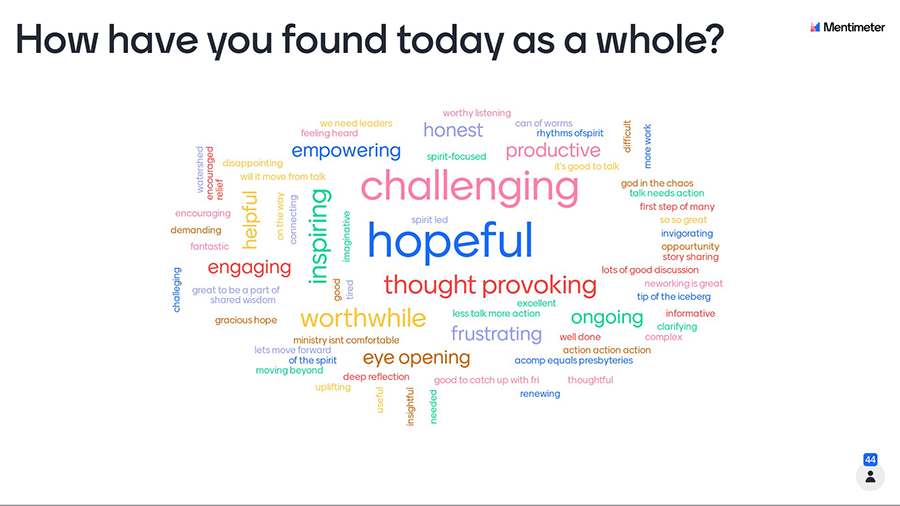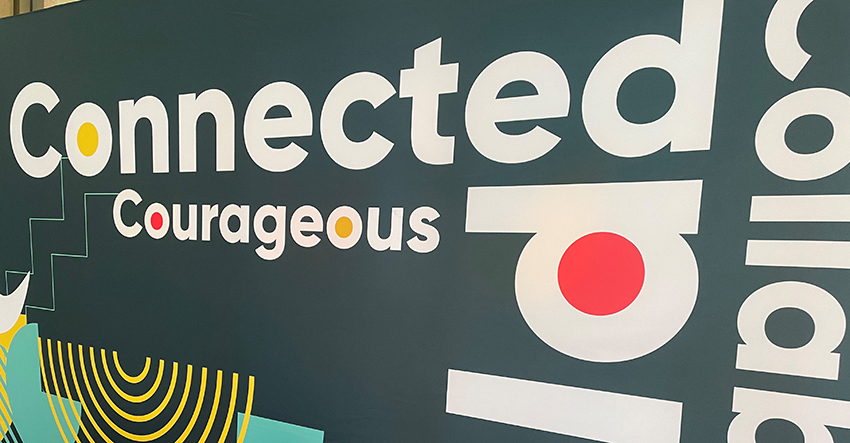On 18 June, ministers and ministry agents met for a day of vision casting about the placements process and more widely how ministry might be reinvigorated and reimagined across the Synod.
As Rev. John Thornton said in his introduction to the day: “We are well aware that placements are an issue for the Synod and today we will be in conversation about this.”
Throughout the day, there was an opportunity, as Rev. Amanda Hay outlined, to have “deep listening and courageous conversations,” about the placements process.
The Advisory Committee on Ministerial Placements (ACOMP) planned the day to look at how the placements procedure can be better aligned with the Church’s Future Directions and the growth of the Church.
Associate Secretary Rev. Bronwyn Murphy said her hopes for the day were that, “we listen to the Church and vision a new way forward. This will involve sacrifice and leaning into the rhythms of the Gospel.”
Rev. John Thornton talked in his “Hearing Voices” message about sticking points and difficulties in the way placements are currently determined. He also challenged the group to think about how we understand call as part of the formation process and what that means for placements and ministerial candidates. With issues like geographical needs of rural Churches that “are withering on the vine” due to a lack of ministry agents willing to take up placements in these areas.
With rural Congregations needing ministers more than ever, how are we imagining call and its implications for the Church. During this part of the day the group gathered heard from Daniel Mossfield, Rev. Christine Palmer and Rev. Alimoni [Moni] Taumoepeau about how new candidates are often placed in challenging areas, when more experienced ministers are not, how the placements process itself seems challenging and how being CALD is often a barrier to placement.
Discussions across the groups raised many pertinent questions about call , career paths and formation. Throughout the day, sentiment was captured in word clouds to begin to capture thoughts and gauge the room for further discusssion.

‘Culture is characterised by lively discipleship’
Rev. Jane Fry talked about the role of Presbyteries in the placements process, ACOMP and the work of the Holy Spirit as we have experienced the courageous decision making that has happened over the last couple of months in Synod in Session.
“I have a very high very of the role of Presbyteries in this Church. If we don’t pay attention to the faith and unity of the Church it will unravel. Presbyteries have responsibility for the culture of the church. We have the tools to pay attention to the health and wellbeing of the Church and it is the Presbyteries that have oversite of this health and wellbeing.
“We have a temptation in this Church to blame structure for everything. When the problem that we have is a different problem. We won’t form disciple-forming communities by fixing ACOMP. Culture is characterised by active lively discipleship. Culture grows through shared faith and stories.
“We need to care for the vocation of the whole Church. That’s how we live into the promise made by the Basis of Union. This is an unprecedented gathering, but the issues that we are raising aren’t primarily ACOMP problems. Most of them are Presbytery responsibilities. Life and Witness Consultations are the responsibilities of the Presbyteries. They have to be diligent in the care of the Churches vocation in relation to their ministers.
“Future Directions raises for us the call of the Holy Spirit on the Church. The decisions we have made during Synod in Session have hopefully been made by the Holy Spirit. We should be amazingly thankful for God not giving up on this Church.
“We keep telling ourselves that we are a Church in decline, but we have made courageous, hopeful decisions. These feel like the work of a forward-thinking Church. How do we gather around the story that gives us life?”
During the day many ministry stories have been shared and a process of deep listening was undertaken.
Rev. Dr Peter Walker and Rev. Jenny Ducker reflected on the day as participants were sent out.
“How are we across the Synod demonstrating unity in regards to ministry placements. It’s good to recognise that all forms of ministry are equally recognised in the Uniting Church. I think we should be developing more fully a theological reflection on “call”. Some interpret call personally and corporately. We need to think afresh about the theology of “call”,” reflected Rev. Dr Walker.
Rev. Jenny Ducker then followed: “There is a need for change and a need to develop a theology of change. Why are we so afraid to let some things die, so that other things might be brought to life? If our processes and culture aren’t serving God’s purposes they shouldn’t be ours. There is new life in Christ. As we leave today I want to say are we willing to trust the Holy Spirit to do the work in us and through us? The wild God is not predictable and are we willing to follow Him.”
The Moderator, Rev. Simon Hansford said of the day: “One of the challenges before us is to be as courageous and hopeful in these times as were at Union and to imagine different possibilities and to attend to the voice of God”.













